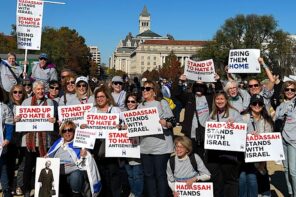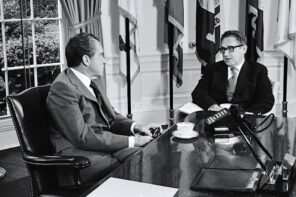Pope Benedict XVI’s recent visit to Israel prompted expressions of anger and disappointment among many Israelis and Jews around the world. Surprisingly, few reacted to his political statements on the Israeli-Palestinian conflict, one of the rawest controversies in current geopolitics, even though Benedict movingly sympathized with Palestinian suffering, explicitly endorsed a two-state solution, and lamented the building of Israel’s separation barrier.
Most Israelis just shrugged (even political leaders seemed to ignore his controversial statements); perhaps because some think the Vatican has little real influence on such issues, perhaps because some agree with him.
By contrast, many Jews (including major politicians, religious leaders, academics, and newspaper columnists) pounced on his May 11 speech at Yad Vashem, Israel’s Holocaust Memorial and Museum. He was criticized for his ambiguity about the perpetrators (the words “Nazi” and “German” are absent) and about the number of victims (“millions of Jews”). He was criticized for omitting any reference to his own past as a German who lived through the war and was briefly (and involuntarily) a member of the Hitler Youth.
Most seriously, he made no mention of Christian responsibility for Jewish suffering.
In the back of many people’s minds, and contributing to the negative response, were his bungled efforts in January to reinstate a schismatic, Holocaust-denying bishop. Unfortunately, other statements made on this trip, including his repeated reaffirmation of the remarkably positive changes in Catholic theological views of Jews and Judaism, were largely ignored.
Looking back, few should have been surprised, for the core dispute here is profound, painful, and almost entirely unbridgeable: the possible link between centuries of Christian and specifically Catholic theological anti-Judaism, and the Holocaust.
All You Had to do was Express Regret
Though seldom put in such straightforward terms, Jews and Catholics (or at least Church leaders) sadly are fated to disagree fundamentally about this, with deep consequences for improved relations. Recent controversies over Benedict’s experiences as a German, Bishop Richard Williamson’s reinstatement, and the behavior of wartime pope Pius XII are variations on this dispute, and (to the extent that they divert attention from it), are distractions.
That is not to say that they’re irrelevant. A bungled response to clear evidence that a reinstated bishop is a Holocaust denier is of course troubling. The possibility that Pius XII, had he been more outspoken, could have saved many Jewish lives is a valid topic for historical research. However, these controversies reflect a more basic dispute over the Church’s responsibility for, or at least indifference to, Jewish suffering; which inevitably ratchets up the rancor and misunderstanding. At such moments, we learn that both Jews and Christians have a powerful need to establish what they see as a correct interpretation of a complex and painful past.
Specifically, the intense emotions around these issues reflect many Jews’ feeling that the Catholic Church itself, and not just individual Catholics, has unacceptably failed to face its own (perhaps indirect) complicity in the Nazis’ murder of Jews. The Church, including Benedict but also earlier Popes, resolutely rejects this linkage. The fallout from Benedict’s speech revealed just how unbridgeable this divide is.
In the wake of the Holocaust, many Jews believe that the largely secular Third Reich chose to (and was largely able to) persecute the Jews because of centuries of Catholic anti-Jewish teachings. That is, the roots of what became Nazi anti-Semitism lie in Christian ideas about the Jews’ malevolence—their guilt for the crucifixion, rejection by God, and adherence to a debased faith—which already appear in the New Testament, and were developed in an extensive Adversus Judaeos tradition. Through repetition and reinterpretation, the argument goes, these prepared many modern Europeans for a genocide that was neither religious nor inevitable. However, it was buttressed by claims made not just incidentally in Catholic (and Protestant) countries and regions, but by Catholic (and Protestant) religious leaders in official religious teachings. Nazi anti-Semitism, though directly linked to secular racism and modern pseudo-science, was nourished by deep wells of theological hatred.
As we saw during Benedict’s visit, the Jewish demands are straightforward and even blunt: the Pope, nearly all said, did not apologize for the ways that Catholic anti-Judaism contributed to the Holocaust. This appears again and again in Israeli newspaper editorials, politicians’ statements, and commentators’ essays. A few examples illustrate this.
Parliament speaker Reuben Rivkin said, “I came as a Jew, hoping to hear an apology and a request for forgiveness from those who caused our tragedy…” He was, he says, disappointed.
Former chief rabbi Meir Lau complained, “there certainly was no apology expressed here.” Major newspapers ran editorials and columns venting disappointment, like a Ha’aretz editorial lamenting that his speech “was missing one word—‘sorry.’”
Almost plaintively, a columnist for Yediot Ahronoth wrote, “All you had to do was to express regret.”
Most striking is the official, negative response from representatives at Yad Vashem after his visit. The only sizable quotation that the representatives include from his original speech, where he speaks on behalf of the Catholic Church as a whole, is followed by their expression of disappointment that he failed to mention “the very anti-Semitism that was the essential underpinning of the Holocaust.” The implication is that sympathy alone, without frank recognition of how Catholic teachings led to the Holocaust, is insufficient from a Catholic leader. Though some critics cast a wider net than others in the range of complaints, all these examples reflect unhappiness with Benedict’s failure to grapple self-critically with a troubling historical legacy.
While their reactions are of course subjective, these assessments are entirely correct. In the speeches of John Paul II and Benedict XVI, as well as in many church documents, there is nothing resembling a direct apology. Catholic leaders were stunned that Jews expected this. Cardinal Walter Kasper, in charge of Church relations with Jews, remarked during the visit, “I was surprised” that some Jews made this demand. Cardinal John Foley, traveling with the Pope, was puzzled, saying, “I don’t know what they’re looking for.” There were many reasons for them to ask this question, for the Vatican has consistently been clear about this.
Most famously in 1998, the Vatican statement on the Holocaust, “We Remember,” was bitterly criticized by Jews for distancing the Church both from the evil acts of individual Christians (“mistrust and hostility that we call anti-Judaism, of which, unfortunately, Christians also have been guilty”) and from secular Nazism (a “modern neo-pagan regime… its roots outside of Christianity”). The latter theme is especially prevalent in other statements, including Benedict’s speech at Yad Vashem. Jews “were brutally exterminated under a godless regime that propagated an ideology of anti-Semitism and hatred.”
Almost identical language, separating Church from Reich, appeared in Benedict’s speech at Auschwitz in 2006. Nazi violence, he says, arose due to “irrationalism or from a spurious and godless reason.” He echoes John Paul’s own speech at Yad Vashem in 2000: “Only a godless ideology could plan and carry out the extermination of a whole people.” This theme, repeated in papal speeches and official documents, seeks to establish beyond a doubt that the Church itself cannot be implicated in anti-Jewish violence. In the words of “We Remember,” its fundamental teachings affirm “the unity of the human race” and “equal dignity of all races and peoples.”
Despite obvious differences between John Paul II and Benedict XVI, this firm refusal to accept any linkage remains unchanged. Even John Paul II’s famous note inserted into the Western Wall in 2000, during his undeniably more successful trip, enigmatically asks forgiveness for “the behavior of those who in the course of history have caused these children of yours to suffer.” At most, individuals were at fault, not an organization. Benedict’s own separation between Catholic Church and Catholic Christians is apparent in a similar enigmatic statement, in an article in the Vatican’s “semi-official” newspaper, L’Osservatore Romano, written a dozen years before he became Pope: “it cannot be denied that a certain insufficient resistance to its atrocity on the part of Christians can be explained by an inherited anti-Judaism present in the hearts of not a few Christians.”
While my own sympathies are probably apparent in my description of the two positions, my primary goal is to illuminate the wide gulf in understanding between the two sides. This made disappointment inevitable. The result was a temporary blow to Jewish-Catholic relations. It does not therefore follow that both sides should simply budge.
Many Jews and Catholics, despite strong commitments to improved interreligious relations, feel their respective needs—for recognition of suffering, for faith in a pure Church—so strongly that compromise or restraint sometimes is not possible. Fortunately, I think the relationship can withstand the current shock. Still, I also think it would be even stronger if the Church followed its admirable inclination to improve relations in others areas, like reinterpreting anti-Jewish biblical passages, in this area as well.
I don’t minimize the challenge this poses to the Church’s idealized image of its behavior in the world. However, the benefits of a frank reckoning with the past, so valuable in other post-conflict settings, exemplified by South Africa, surely apply here as well.




